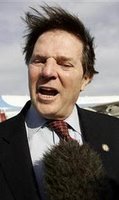
By Steve Charing
If you are reading this column, you would most likely appreciate how traumatic the coming out process can be—even if your personal experience was event-free. For most lgbt people this significant step is fraught with all kinds of potential downsides: alienating the person you’re talking to is prominent among them. It is especially dicey if you are divulging your sexual orientation to a family member or perhaps to your best friend and mentor.
The latter was the case during a recent TV episode of Everwood, a family drama series shown locally on the WB54. The character of Kyle (played by Steven R. McQueen—grandson of actor Steve McQueen) is a 15 year-old moody, talented, piano-playing loner who was taken under the wing of series regular Ephram Brown—also moody and about age 19 (played by Gregory Smith, pictured). Ephram sees himself in Kyle when he was that age, and offers to tutor the boy for free to help him get into Julliard.
During the episode, Kyle was resistant to attending a school dance and also blew off one of the school’s hottest girls. His initial lack of interest prompted Ephram to discuss the situation with his gym-obsessed roommate Reid (played by the hunky Justin Baldoni) who suggested that Kyle may be gay.
Ephram was disturbed by that prospect, but was quick to tell Reid he is not a homophobe. He just doesn’t want the boy to be even more alienated. To test the hypothesis that he may be gay Ephram pressed Kyle hard to attend the dance and offered to chauffeur him back and forth. He was hoping, of course, that Kyle would have a great time and have a babe on each arm. Reluctantly Kyle attended, and one would think he was heading to death row by his negative demeanor.
When Kyle left the dance early, alone and angry, Ephram saw the pain Kyle was experiencing and felt guilty for pushing him into this situation. By now the audience has assumed Kyle had to be gay; he may as well have worn the rainbow flag on his shirt. But wary of the gay tease that was put forth in the case of Reid earlier this season, I was wondering if this was yet another maneuver by the writers.
The denouement occurred whereby Ephram confronted a teary-eyed Kyle in the boy’s bedroom following the traumatic dance experience. Before Kyle could finish the sentence that made the admission, Ephram helped him out by saying the g-word: "There’s absolutely nothing wrong with being… gay."
Kyle then questioned, "Why do I have to be something I don’t want to be? Why can’t I pretend it’s not there?"
Ephram responded, "Then you’d be lying to yourself and denying to yourself the entire life you deserve. For what?"
He went on, "Listen to me. The sooner you can accept who you are, to be okay with it, the better off you’re gonna be, the happier you’re gonna be."
When Kyle admitted that he doesn't want to give people "another reason to hate me," Ephram assured him, "Right now, you're the only one that hates you."
OK, this is fiction, so what is the significance of this story line? First off, the show’s creator Greg Berlanti is openly gay. Through the four years of Everwood’s run, very few plot lines have touched on lgbt issues. Perhaps this one was near and dear to Berlanti’s heart; maybe he related Kyle’s experience to his own. It could be that Berlanti wanted this included, as this could be the final season for Everwood. The merger between UPN and the WB could spell doom for many of the current series.
Secondly, the show is viewed by a predominantly young audience—mainly teens and those in their twenties watch this critically acclaimed drama.
"Kyle’s coming out on Everwood will have a great impact on young people," Damon Romine, Entertainment Media Director of GLAAD told OUTloud. "Gay teens need to see that they are not alone, which is why our visibility is so important." He added, "Kyle's feelings of isolation and confusion are something many gay teens experience, but Ephram stepping up to be an ally and a friend sends a great message to straight and gay viewers alike."
Indeed, for young gays and their allies, this episode hit the mark.


